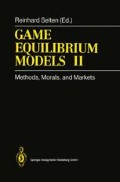Abstract
This paper is an attempt to model three salient features of futures markets for exhaustible resources: oligopolistic control of the market for the basic commodity, the purely speculative nature of most of futures trading and apparent availability of unlimited funds to the traders.
Interaction between the extraction policy of duopolists and their futures trading is modelled with the help of a two-stage noncooperative game with incomplete information. The second stage is a two-period extraction game, which shows how futures positions taken by the producers affect their planned extraction rates and the resulting spot price of the resource. The first stage is a noncooperative futures game in which equilibrium net positions of and subgame perfect contracts between two producers and a representative speculator are determined.
The purely speculative part of futures positions depends mainly on the (known) structure of inconsistent prior beliefs about the level of uncertain market demand for the basic commodity. The hedging part is related to (known) levels of stocks of the resource available to the individual producers, and to their degree of risk aversion. The conditions under which each player goes net short or net long are worked out in detail.
This paper was written while the authors were visiting the Center for Interdisciplinary Research, Bielefeld, W. Germany. We are grateful for the Center’s support, and for helpful comments from T. Brianza, E. van Damme, J.-F. Richard, Y. Richelle and R. Selten.
Access this chapter
Tax calculation will be finalised at checkout
Purchases are for personal use only
Preview
Unable to display preview. Download preview PDF.
References
Anderson, R.W., ed. (1984). The Industrial Organization of Futures Markets. Lexington, Mass: D.C. Health and Company.
Anderson, R.W. and C.L. Gilbert (1988). Commodity Agreements and Commodity Markets - Lessons from Tin. The Economic Journal 98: 1 – 15.
Anderson, R.W. and M. Sundaresan (1984). Futures Markets and Monopoly, In: R.W. Anderson (ed.): The Industrial Organization of Futures Markets. Lexington, Mass.: D.C. Health and Company, pp: 75 – 106.
Aumann, R.J. and M. Maschler (1964). The Bargaining Set for Cooperative Games. In: M. Dresher, L.S. Shapley and A.W. Tucker (eds.): Advances in Game Theory. Annals of Mathem. Studies No 52. Princeton, N.J.: Princeton University Press, pp. 443 – 476.
Brianza, T., L. Phlips and J.-F. Richard (1987). Futures Markets, Speculation and Monopoly“. Revised version of CORE Discussion Paper 8725, Louvain-la-Neuve.
Harsanyi, J.C. and R. Selten (1988). A General Theory of Equilibrium Selection in Games. Cambridge, Mass.: MIT Press.
House of Commons (1986). The Tin Crisis. Second Report from the Trade and Industry Committee, Session 1985 – 86. London: HMSO.
Kreps, D.M. (1977). A Note on ‘Fulfilled Expectations’ Equilibria. J. Econom. Theory 14: 32 – 43.
Milgrom, P.R. and N.L. Stokey (1982). Information, Trade and Common Knowledge. J. Econom. Theory 26: 17 – 27.
Novshek, W. (1985). On the Existence of Cournot Equilibrium. Rev. Econom. Studies 52: 85 – 98.
Reinganum, J.F. and N.L. Stokey (1985). Oligopoly Extraction of a Common Property Natural Resource: the Importance of the Period of Commitment in Dynamic Games. Intern. Econom. Rev. 26: 161 – 173.
Selten, R. (1982). Einführung in die Theorie der Spiele mit unvollständiger Information. Information in der Wirtschaft, Schriften des Vereins für Socialpolitik, Gesellschaft für Wirtschafts-und Sozialwissenschaften, N.F. Bd. 126: 81 – 147, Berlin: Duncker & Humblot.
Tirole, J. (1982). On the Possibility of Speculation Under Rational Expectations. Econometrica 24: 74 – 81.
van Damne, E.E.C. (1987). Stability and Perfection of Nash Equilibria. Berlin: Springer-Verlag.
Varian, H.R. (1989). Differences in Opinion in Financial Markets. In: C. Stone (ed.): Financial Risk: Theory, Evidence and Implications. Amsterdam: Kluwer Academic Publishers.
Editor information
Editors and Affiliations
Rights and permissions
Copyright information
© 1991 Springer-Verlag Berlin Heidelberg
About this chapter
Cite this chapter
Phlips, L., Harstad, R.M. (1991). Interaction between Resource Extraction and Futures Markets: A Game-Theoretic Analysis. In: Selten, R. (eds) Game Equilibrium Models II. Springer, Berlin, Heidelberg. https://doi.org/10.1007/978-3-662-07365-0_11
Download citation
DOI: https://doi.org/10.1007/978-3-662-07365-0_11
Publisher Name: Springer, Berlin, Heidelberg
Print ISBN: 978-3-642-08109-5
Online ISBN: 978-3-662-07365-0
eBook Packages: Springer Book Archive

